|
 Secure Site
Secure Site
|
 |
Archive for the 'Sleep Habits' Category
 Pierre-Cécile Puvis de Chavannes: The Dream, 1883
Sleep Type: The Human Alarm Clock
You crash as soon as your head hits the pillow, but wake like clockwork at 2, 3, or 4 a.m.
What’s Going On?
“We all wake up briefly — two to three dozen times a night — without awareness or memory,” says Paul Glovinsky, Ph.D., coauthor of “The Insomnia Answer.” If you’re all too aware of your awakenings, a number of things may be going on. Simple conditioning, a la Pavlov’s dogs, could be to blame. Your body can be “on the lookout for that awakening, especially if there’s a clock in the bedroom,” Glovinksy says. Also consider stress: You may fall asleep out of pure exhaustion, but as soon as your sleep needs are slightly quenched, anxieties wake you up again. For some people, says Rubin Naiman, Ph.D., director of Sleep Programs at Miraval Resort, the body’s inner clock, or circadian rhythms, may be malfunctioning
What to Do
Whatever’s behind your awakenings, hiding your neon time reminder is step one. This would be the perfect time to get the Zen Alarm Clock in the Digital style (so you could close the lid) or the original style without the light. If you can’t see the clock, you won’t panic as you calculate how many hours remain until daybreak — and how little you’ve slept. “Put it on the floor or close the cover to the Zen Clock,” says Joyce Walsleben, R.N., Ph.D., associate professor of medicine at New York University. “When the alarm chimes, you can get up, but otherwise, you’re in bed to sleep.” For many people, this simple shift alone reconditions their brain.
Boulder, Colorado—an innovative company has taken one of life’s most unpleasant experiences (being startled awake by your alarm clock early Monday morning), and transformed it into something to actually look forward to. “The Zen Alarm Clock,” uses soothing acoustic chimes that awaken users gently and gradually, making waking up a real pleasure.
What makes this gentle awakening experience so exquisite is the sound of the natural acoustic chime, which has been tuned to produce the same tones as the tuning forks used by musical therapists. According to the product’s inventor, Steve McIntosh, “once you experience this way of being gradually awakened with beautiful acoustic tones, no other alarm clock will ever do.”
adapted from Body + Soul, May 2008 by Sarah Schmelling
 Alarm Clocks for a Progressive Awakening, Zen Clocks in Digital Styles Now & Zen – The Most Gentle Alarm Clocks with Chimes
Visit Our Shop
1638 Pearl Street
Boulder, CO 80302
Posted in Bamboo Chime Clocks, Goodness, Japanese Inspired Zen Clocks, Meditation Timers, Meditation Tools, mindfulness practice, Natural Awakening, Progressive Awakening, Sleep Habits, Well-being, Zen Clocks and Dream Recall
 Koitsu, Full Moon at Akashi Beach Warm milk, chamomile tea, curling up with The Poetry of Zen—all useful strategies in the battle to beat insomnia. You might want to add auricular, or ear, acupuncture to the arsenal. A review of six trials in The Journal of Alternative and Complementary Medicine found that stimulating certain acupuncture points around the ear could put your insomnia to sleep. Six points were deemed the most effective: shenmen, heart, occiput, subcortex, brain, and kidney.
Hong Kong Baptist University researchers noted acupuncture’s rate of success was high both when compared to a placebo and to sleep medications and anti-anxiety drugs. How auricular acupuncture works is still being explored, but initial studies indicate it increases melatonin, the sleepy-time hormone.
Our Zen Alarm Clock’s long-resonating Tibetan bell-like chime makes waking up a beautiful experience – its progressive chimes begin your day with grace. When the clock’s alarm is triggered, the acoustic chime bar is struck just once … 3-1/2 minutes later it strikes again … chime strikes become more frequent over 10 minutes … eventually striking every 5 seconds until shut off. As they become more frequent, the gentle chimes will always wake you up – your body really doesn’t need to be awakened harshly, with a Zen Clock you’re awakened more gradually and thus more naturally. Unlike artificial recorded sounds coming out of a tiny speaker in a plastic box, natural acoustic sounds transform your bedroom or office environment.
adapted from Natural Solutions,January 2008 By Matthew Solan
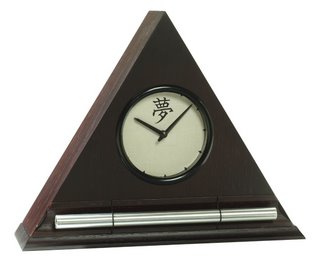 Dream Kanji Zen Alarm Clock with chime in Dark Oak Finish, a wellness tool for insomnia
Now & Zen’s Chime Alarm Clock Store
1638 Pearl Street
Boulder, CO 80302
(800) 779-6383
Posted in Chime Alarm Clocks, Japanese Inspired Zen Clocks, Natural Awakening, Now & Zen Alarm Clocks, Progressive Awakening, Sleep Habits, Ukiyo-e
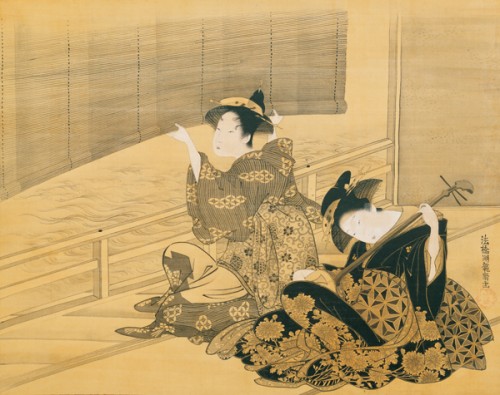 Isoda Koryusai, Japanese (active c. 1764–1788), Courtesan Playing the Samisen Home is a container of soul health. The roof and walls shelter and nurture the spark of life that animates our modes of dwelling. They define the setting where soul health is transformed from raw energy into the myriad experiences of living. Furniture, clothing, and other objects foster the inner work of the psyche. The bed encourages the soul to dream and make love. Each element of home plays its role in bringing forth the latent possibilities of soul.
The headlines of spiritual experience are often grabbed by dramatic tales of angelic light and celestial encounters, but soulfulness mainly grows within the realms of everyday life. A cozy moment in bed that warms a deep place within us, a conversation at the kitchen table that connects parent and child, and other common experiences sustain and enrich the depths of who we are.
The needs of soul health are satisfied through the archetypal actions of human dwelling —cooking, eating, gathering with others, sleeping, dreaming, lovemaking, bathing, managing finances, and solitude. Cooking, for example, is a practical activity that creates edible meals; it also cares for the souls health creative urge to transform the raw stuff of life into digestible and appetizing forms. Eating satisfies the hunger in our bellies, but also satisfies the soul’s desire for fulfillment.
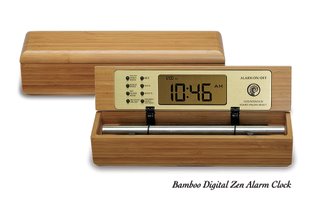 Bamboo Digital Chime Clock, a calming timer and alarm clock made from natural materials like bamboo, walnut, and maple The rooms and furniture of your home are more than a mere collection of isolated objects. They are tangible nurturers of soul health. A home for the soul sparks our imagination. Its architecture and furnishings offer more than mechanical functions and urge us to explore the essence of who we truly are. Colors, textures, and shapes act as bridges that lead our attention from the material world of isolated objects into the interconnected realm of he spirit.
A home for the soul offers more than one level of experience at a time. It simultaneously addresses all levels of mind, body, and environment—our myths, emotions, thoughts, senses, actions, bodily functions, and the ecological processes of nature. The bathtub of such a home might honor Venus’s desire for beauty, ease the conflict of a hectic day, warm and soothe the body, cleanse the skin’s pores, and connect us to the sprinkling of rain and the flowing of streams.
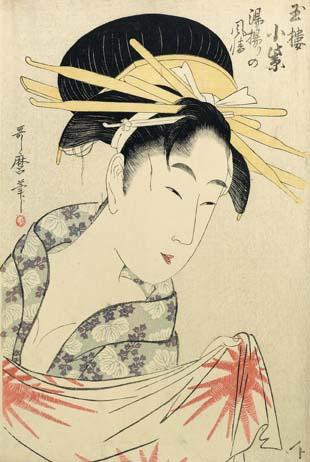 Kitagawa Utamaro, Komuraski of the Tamaya, House After a Bath, 1795 A home for the soul is not a material goal to be acquired, but a setting for inquiring into the processes of living. Within its walls we can discover how the germ of consciousness within us grows to become the events and circumstances that define our existence. We can discern the links between our personal needs and dreams and the universal forces that shape the cosmos. In a home for the soul health, common objects and actions become symbols that at once hide and reveal the deeper powers that animate our lives.
A home for the soul has character and personality. It contains rich textures and colors that invite the hand and delight the eye. It reflects subtle gradations of light that range from murky shadows to shimmering points of illumination. Forms are imaginative and reveal how they support activity. There is care and attention to detail. Natural materials such as wood, stone, wool, silk, and cotton are used to create an environment that opens to the vitality of sunlight and fresh air. A home for the souls health is a sensuous dwelling place that urges us to savor the mingling of spirit and matter.
Boulder, Colorado—an innovative company has taken one of life’s most unpleasant experiences (being startled awake by your alarm clock early Monday morning), and transformed it into something to actually look forward to. “The Zen Alarm Clock,” uses soothing acoustic chimes that awaken users gently and gradually, making waking up a real pleasure. Rather than an artificial recorded sound played through a speaker, the Zen Clock features an alloy chime bar similar to a wind chime. When the clock’s alarm is triggered, its chime produces a long-resonating, beautiful acoustic tone reminiscent of a temple gong. Then, as the ring tone gradually fades away, the clock remains silent until it automatically strikes again three minutes later. The frequency of the chime strikes gradually increase over ten-minutes, eventually striking every five seconds, so they are guaranteed to wake up even the heaviest sleeper. This gentle, ten-minute “progressive awakening” leaves users feeling less groggy, and even helps with dream recall.
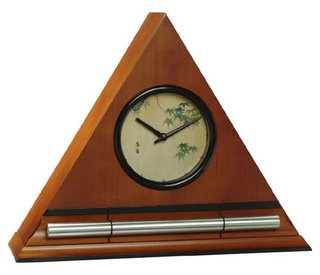 Zen Chime Clock with Japanese Maple Leaves in Honey Finish, an alarm clock for your body, mind and spirit Now & Zen – The Gentle, Soothing Alarm Clock Store
1638 Pearl Street
Boulder, CO 80302
adapted from Natural Home, July/August 1999
Reprinted from Home for the Soul by Anthony Lawlor. Copyright © 1997, Anthony Lawlor. Reprinted with permission of Clarkson N. Potter, a division of Crown Publishers.
Posted in Chime Alarm Clocks, Japanese Inspired Zen Clocks, mindfulness practice, Natural Awakening, Progressive Awakening, Sleep Habits
 Lack of Sleep Although the occasional all-nighter is OK, people who regularly skimp on z’s can’t undo sleep deprivation’s detrimental effects by simply hitting the snooze button on weekends, says a new study in the journal Science of Translation Medicine. Contrary to popular belief, the energy you feel after a Saturday morning sleep session is only short lived, according to the study. Chronic sleep loss has a cumulative effect on performance.
Why? Lack of sleep raises levels of the stress hormone cortisol and affects a person’s ability to respond to stimuli, says Catherine Darley, ND, founder of Seattle’s Institute of Naturopathic Sleep Medicine. Sleep also plays a key role in mood regulation and overall physical and mental functioning. If you need some extra help falling asleep, try a natural insomnia supplement made with melatonin, tryptophan, or valerian.
Remember,waking up in the morning should be as pleasant as falling asleep at night. The Zen Alarm Clock’s gradual, gentle awakening is transformative. “The Zen Alarm Clock,” uses soothing acoustic chimes that awaken users gently and gradually, making waking up a real pleasure. What makes this gentle awakening experience so exquisite is the sound of the natural acoustic chime, which has been tuned to produce the same tones as the tuning forks used by musical therapists. According to the product’s inventor, Steve McIntosh, “once you experience this way of being gradually awakened with beautiful acoustic tones, no other alarm clock will ever do.”
 Waking in the Morning, Kitagawa Utamaro, Komuraski of the Tamaya, House After a Bath, 1795 adapted from Natural Solutions Magazine By Stacy Lindsay, 8/2010
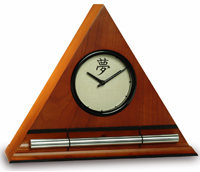 Gradual, Soothing Chime Alarm Clocks
Now & Zen – The Zen Alarm Clock Store
Chime Alarm Clocks with Progressive Awakening
1638 Pearl Street
Boulder, CO 80302
(800) 779-6383
Posted in Bamboo Chime Clocks, Now & Zen Alarm Clocks, sleep, Sleep Habits
 B.P. Lathrop, title and date unknown, woodblock print Sleep patterns around the world have undergone a revolution over the past two centuries as the spread of artificial lighting profoundly changed the shape of human lives, first in cities and now even in many remote villages. Throughout most of history sundown brought an end to the activities in most homes, with people crawling into bed soon afterwards.
A. Roger Ekirch—author of a magisterial history of nighttime, At Day’s Close (Norton)— argues that the very nature of a night’s rest has changed since the Industrial Revolution. Sleep for our ancestors were often divided into two shifts of roughly four hours, with a period of wakefulness lasting an hour or longer in between.
A study conducted by the U.S. government’s National Institute of Mental Health appears to confirm Ekrich’s thesis. When people in an experiment were deprived of artificial light throughout the evening and night, they began to exhibit “a pattern of broken slumber—one practically identical to that of pre-industrial households,” Ekirch writes. Researchers in the study, noted hormonal changes in test subjects and “likened this period of wakefulness to something approaching an altered state of consciousness not unlike meditation.”
We still call midnight “the bewitching hour” because pagans in Europe practicing their old religion in defiance of Christian bans secretly performed rituals in this interval between rounds sleep. But Ekrich believes this period of nocturnal time-out-of-time played an important role in the psychic lives of almost everyone as an opportunity to reflect, pray, make love, think about your dreams— contemplative activities which were impossible to pursue during days of long, hard work. Night was the time for inner explorations of spirit and soul. “By turning night into day,” he writes, “modern technology has helped to obstruct our oldest path to the human psyche.”
While it may not be practical for many of us to reclaim the sleep patterns of pre-industrial peoples, we can easily incorporate some elements of this midnight reflection into our lives. Try turning off the lights early, and spending some time alone with our thoughts before going to sleep, or doing that in the morning rather than jumping right out of bed. And if you do experience trouble sleeping, think of the time awake as a gift of contemplation rather than the burden of insomnia.
 Wake up refreshed, love your alarm clock, transform your mornings with The Zen Alarm Clock's progressive awakening with gentle chimes. Boulder, Colorado—an innovative company has taken one of life’s most unpleasant experiences (being startled awake by your alarm clock early Monday morning), and transformed it into something to actually look forward to. “The Zen Alarm Clock,” uses soothing acoustic chimes that awaken users gently and gradually, making waking up a real pleasure. Rather than an artificial recorded sound played through a speaker, the Zen Clock features an alloy chime bar similar to a wind chime. When the clock’s alarm is triggered, its chime produces a long-resonating, beautiful acoustic tone reminiscent of a temple gong. Then, as the ring tone gradually fades away, the clock remains silent until it automatically strikes again three minutes later. The frequency of the chime strikes gradually increase over ten-minutes, eventually striking every five seconds, so they are guaranteed to wake up even the heaviest sleeper. This gentle, ten-minute “progressive awakening” leaves users feeling less groggy, and even helps with dream recall.
adapted from Ode, November 2005 by Jay Walljasper
 Zen Chime Clock with Japanese Maple Leaves in Honey Finish, a nighttime tool for insomniacs Now & Zen’s Alarm Clock Store
1638 Pearl Street
Boulder, CO 80302
Posted in Bamboo Chime Clocks, Chime Alarm Clocks, Japanese Inspired Zen Clocks, Natural Awakening, Now & Zen Alarm Clocks, Progressive Awakening, Sleep Habits
 Dream, Pablo Picasso Birds do it. Cats do it. And Spaniards most especially do it—every day, in broad daylight.
They nap. Proudly, without a hint of embarrassment. Grown adults—executives, teachers, civil servants—wink off in the middle of the workday like kindergartners at mat time. From 1 or 2 o’clock to 4:30 or so every afternoon, Spain stops the world for a stroll home, a leisurely meal, a few z’s. Common Market technocrats have informed the Spanish that this is not the way things will get done in the oft-threatened unified Europe. The Spanish reply with a flourish of rioja and snooze alarms. ¡Viva siesta!
At a time when productivity is the world’s largest religion, the siesta tradition lives on. In Spain, work operates under the command of life, instead of the other way around. No task is so critical that it can’t wait a couple of hours while you attend to more important matters like eating, relaxing, or catching up on sleep from a night on the town. When the midday break hits, offices empty and streets clear as if by the hand of Rod Serling. Befuddled foreigners left behind quickly learn that they have entered a new circadian order.
Taking a long break in the middle of the day is not only healthier than the conventional lunch; it’s apparently more natural. Sleep researchers have found that the Spanish biorhythm may be tuned more closely to our biological clocks. Studies suggest that humans are “biphasic” creatures, requiring days broken up by two periods of sleep instead of one up-till-you-drop “monophasic” shift. The drowsiness you feel after lunch comes not from the food but from the time of day. “All animals, including humans, have a biological rhythm,” explains Claudio Stampi, director of the Chrono Biology Research Institute in Newton, Massachusetts. “One is a 24-hour rhythm—we get tired by the end of the day and go to sleep—and there is a secondary peak of sleepiness and a decrease in alertness in the early afternoon. Some people have difficulty remaining awake, doing any sort of task between one and four in the afternoon. For others it’s less difficult, but it’s there. So there is a biological reason for siestas.”
 Digital Zen Alarm Clocks, available in maple, walnut, bamboo, and black lacquer Unlike the average lunch break, the siesta is a true break in the action because there is no choice but to come to a full and complete stop. You can’t do errands; the shops are closed. You can’t make business calls; nobody’s at the office. Most people go home for lunch, or get together with family or friends for a glass of vino, and nod out afterwards.
Like a lot of us in the land of time scarcity, I find it harder and harder to shut it off, to switch off work mode and be social—that is, be unproductive, and just be. The divide is blurred by a volatile economy of all-consuming competition that has turned off-hours into off-site catch-up. Blink and it’s Monday again. The culprit, says David Scott, an associate professor of recreation, park, and tourism sciences at Texas A&M, is the accelerating cult of efficiency.
“We are an efficiency-oriented society,” he says. “It is perhaps the dominant value in this culture. The faster things get done, the better off we’re going to be. The idea of efficiency at all costs seems to be all-pervasive. It tends to invade our leisure. Unfortunately, socializing doesn’t have a ‘yield.’ It’s hard to develop relationships; those things take time.”
The siesta lifestyle is rooted in a culture with values that are anathema to the ascendant economic order, so don’t expect the rest of Europe to adopt Spanish hours. A few Spanish firms have begun shortening their siesta time as the eurodollar era approaches. But maybe, being the great taskmasters we are, we could find a way to put one quality-of-life item on the agenda each day. We could even give it a productive rationale: Life expectancy in Spain is two years longer than in the United States. Think of all that extra output.
Our Digital Zen Clock’s long-resonating Tibetan bell-like chime makes waking up a beautiful experience – its progressive chimes begin your day with grace. When the clock’s alarm is triggered, the acoustic chime bar is struck just once … 3-1/2 minutes later it strikes again … chime strikes become more frequent over 10 minutes … eventually striking every 5 seconds until shut off. As they become more frequent, the gentle chimes will always wake you up – your body really doesn’t need to be awakened harshly, with a Zen Clock you’re awakened more gradually and thus more naturally.
What makes this gentle awakening experience so exquisite is the sound of the natural acoustic chime, which has been tuned to produce the same tones as the tuning forks used by musical therapists. According to the product’s inventor, Steve McIntosh, “once you experience this way of being gradually awakened with beautiful acoustic tones, no other alarm clock will ever do.”
adapted from Escape Mazaine, July 1998
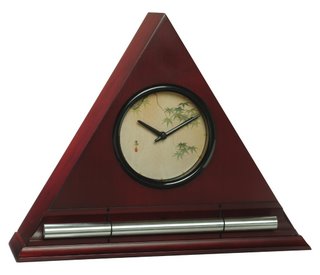 Japanese Leaves Dial Face in Burgundy Finish by Now & Zen Now & Zen – The Peaceful Chime Alarm Clock Store
1638 Pearl Street
Boulder, CO 80302
(800) 779-6383
Posted in Chime Alarm Clocks, Japanese Inspired Zen Clocks, mindfulness practice, Natural Awakening, Now & Zen Alarm Clocks, Progressive Awakening, Sleep Habits, Well-being
 rest and relaxation You know a little too well what your kitchen looks like at 3 a.m. You’ve memorized the light patterns on your bedroom ceiling, counted thousands of sheep, and watched your Zen Alarm Clock for countless hours. And you’ve come to expect the thump of the newspaper at the front door a few minutes after 5.
If this sounds familiar, you’re in good company: Sixty-seven percent of American women surveyed in last year’s National Sleep Foundation poll said they regularly have trouble sleeping. Many of the culprits are hallmarks of our current culture: long work hours, stress, sugar-laden cappuccinos, wanting to fit too much into one day. Several recent reports, including a study published in Social Science & Medicine titled “Is Sleep Really for Sissies?,” have suggested that we value what we do during the day much more than what goes on at night.
But good sleep isn’t something we can afford to take off our to-do list. Like a nutritious diet and exercise, sleep is a foundation for health — not to mention sanity.
“It’s a bedrock,” says Paul Glovinsky, Ph.D., coauthor of “The Insomnia Answer.” As anyone with sleep trouble knows, a single bad night can hamper productivity, memory, even basic conversation skills. But it’s over time that insomnia really takes its toll. “We’ve seen that, in all kinds of ways, deficits accrue when you don’t sleep.”
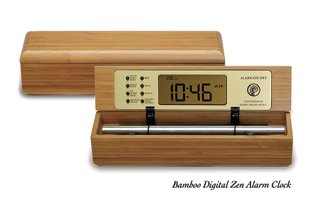 Bamboo Digital Chime Clock, for a progressive awakening Poor sleep may set you up for heart problems, for instance, plus lowered immunity, depression, diabetes, obesity, and chronic pain. One study actually proved that sleep deprivation can damage our mood in a very real way: Compared with those of rested people, the emotional centers of the brain in sleep-deprived people were 60 percent more reactive to negative experiences.
So what’s a droopy-eyed, overcaffeinated, dream-deficient woman to do? Committing to good sleep hygiene is a start. But it also pays to identify your unique sleep profile. There’s no single insomnia pattern; there are many. And delving into the details of yours can help you overcome it.
We went to several sleep experts with some common sleep types, like the person who can’t stop thinking, the one who wakes up at odd times, and the one who keeps finding excuses to push off bedtime (Really? Another episode of “House Hunters?”).
As it turns out, these patterns often have distinct causes and solutions. Don’t be surprised if more than one profile rings true; your patterns may fluctuate. The key is to give some serious thought to your sleep life. Use The Zen Timepiece with the Bowl /Gong to waken you. Try turing it around so that the digital display doesn’t show. The quality of your waking life — not to mention your health — depends on it.
Boulder, Colorado—an innovative company has taken one of life’s most unpleasant experiences (being startled awake by your alarm clock early Monday morning), and transformed it into something to actually look forward to. “The Zen Alarm Clock,” uses soothing acoustic chimes that awaken users gently and gradually, making waking up a real pleasure.
The luxurious awakening provided by the Zen Alarm Clock is part of the growing preference for things natural—natural foods, natural fibers, and now, natural acoustic sounds. Like organic tomatoes in your salad, the organic sounds of the Zen Alarm Clock’s sweet acoustic chimes are truly a gourmet experience.
What makes this gentle awakening experience so exquisite is the sound of the natural acoustic chime, which has been tuned to produce the same tones as the tuning forks used by musical therapists. According to the product’s inventor, Steve McIntosh, “once you experience this way of being gradually awakened with beautiful acoustic tones, no other alarm clock will ever do.”
Adapted from Body + Soul Magazine, May 2008 by Sarah Schmelling
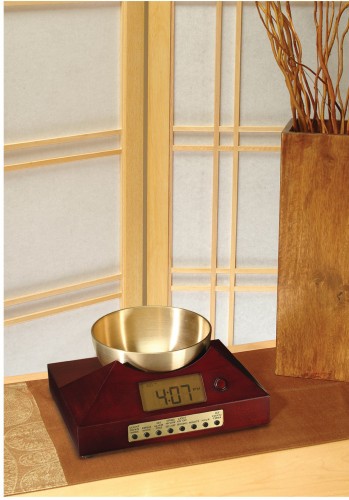 Zen Alarm Clock for a Gentle Awakening with a Bowl Gong and Mindfulness Timer Now & Zen’s Alarm Clock Shop
1638 Pearl Street
Boulder, CO 80302
(800) 779-6383
Posted in Bamboo Chime Clocks, Chime Alarm Clocks, Japanese Inspired Zen Clocks, Natural Awakening, Now & Zen Alarm Clocks, Progressive Awakening, Sleep Habits, Ukiyo-e, wabi-sabi, Well-being, Zen Timepiece by Now & Zen, Zen Timers
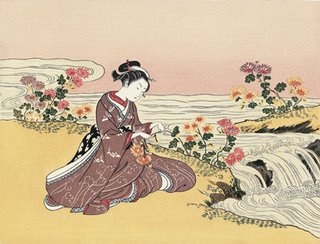 Harunobu Suzuki, A Girl Collecting Chrysanthemum Dew by the Stream Meditation is often credited with helping people feel more focused and energetic, but are the benefits measurable?
A new study suggests that they are. When researchers tested the alertness of volunteers, they found that the practice proved more effective than naps, exercise or caffeine. The results were presented at a recent conference of the Society for Neuroscience.
The researchers, led by Prashant Kaul of the University of Kentucky, took 12 students who did not meditate and taught them the basics in two short sessions.
Then, over a series of weeks, the students were asked to come in and take a test devised to measure skills like reaction time. The tests involved a series of visual cues on a display screen that the volunteers had to react to by pushing the correct button.
The students were asked to take the tests in mid- to late afternoon, when people tend to be sleepiest. They did so before and after 40 minutes of meditating, napping or exercising, or after taking caffeine. Napping produced poor results, presumably because of “sleep inertia,” the researchers said.
Caffeine helped, and exercise was unpredictable.
Earlier studies have found that people are awake while meditating but that their brains undergo changes similar to patterns found in sleep. Some studies have found that people who meditate a lot report sleeping less, so the researchers were curious to see if meditation could serve the same function as sleep. The results support the idea that it can.
In fact, when some of the students were asked to skip a night’s sleep and then take the test, the researchers said, meditation was even more helpful.
Although meditation can be done in almost any context, practitioners usually employ a quiet, tranquil space, a meditation cushion or bench, and some kind of timing device to time the meditation session. Ideally, the more these accoutrements can be integrated the better. Thus, it is conducive to a satisfying meditation practice to have a timer or clock that is tranquil and beautiful. Using a kitchen timer or beeper watch is less than ideal. And it was with these considerations in mind that we designed our digital Zen Alarm Clock and practice timer. This unique “Zen Clock” features a long-resonating acoustic chime that brings the meditation session to a gradual close, preserving the environment of stillness while also acting as an effective time signal.
adapted from The New York Times, October 2006 by Eric Nagourney
 Digital Zen Alarm Clocks, meditation timers and alarm clocks with chimes Now & Zen’s Meditation Timer Store
1638 Pearl Street
Boulder, CO 80302
Posted in Chime Alarm Clocks, Japanese Inspired Zen Clocks, Meditation Timers, Meditation Tools, Natural Awakening, Now & Zen Alarm Clocks, Progressive Awakening, Sleep Habits, Well-being
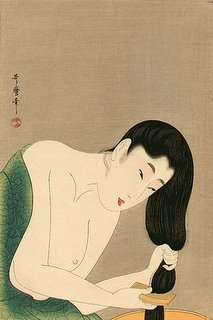 Utamaro Kitagawa, Bijin Combing Her Hair, 1750-1806 The key to create a wind-down period before bedtime is to create some space between your busy day and sleep time. “You can’t just work until 9 at night, and then stick your head on the pillow and fall asleep,” Khalsa says. So turn off the television, computer, and radio. Cut down on or eliminate evening classes and exercise that leaves you feeling amped up.
When you come home, honor this transition by playing relaxing music, lighting candles, or putting on your favorite pajamas and set your Zen Alarm Clock. Think of the yoga precept of pratyahara: Withdraw your senses in order to turn inward.
Our unique “Zen Clock” features a long-resonating acoustic chime that brings the meditation session to a gradual close, preserving the environment of stillness while also acting as an effective time signal.
adapted from yogajournal.com ‘Sweet Slumber’ by Nora Isaacs
 Zen Alarm Clock for a Gentle Awakening with a Bowl Gong
Now & Zen’s Chime Timer
1638 Pearl Street
Boulder, CO 80302
Posted in Bamboo Chime Clocks, Japanese Inspired Zen Clocks, Meditation Timers, Meditation Tools, mindfulness practice, Natural Awakening, Now & Zen Alarm Clocks, Progressive Awakening, Sleep Habits, Ukiyo-e, Well-being, Zen Timepiece by Now & Zen, Zen Timers
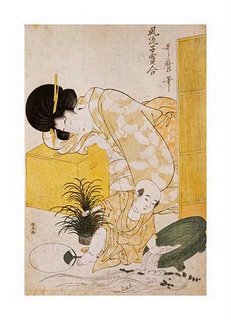 Utamaro Kitagawa, A Mother Dozing While Her Child Topples a Fish Bowl A recent poll at the McGraw-Hill Companies posed this question to a few thousand employees: if there were more hours in the day, would you work, sleep, relax, socialize, or play? For the overwhelming majority, the answer was a no-brainer: sleep.
This is serious news: the Institute of Medicine of the National Academy of Sciences reports that sleep-related fatigue costs U.S. businesses $150 billion annually in absenteeism, accidents, and lost productivity. Charles Czeisler, M.D., a professor of sleep medicine at Harvard Medical School, has found that pulling an all-nighter or sleeping as little as four to five hours daily for a week produces the level of cognitive impairment experienced by a person who is legally drunk. Yet we glorify people who sacrifice sleep.
The U.S. is not the only sleep-deprived nation. As globalization takes its toll, cities in Spain are seeing the disappearance of the siesta due to long commutes that make a midday trip home impractical.
The problem even has Japan taking snoozing seriously. High school teachers in some areas are dimming the lights to give students a power nap. And in Bangkok, Thailand, last November, civil servants were encouraged to take naps at lunchtime in a room where cell phones are banned.
Sara Mednick, Ph.D., author of Take a Nap! Change Your Life, says that napping is also catching on in New York City, where MetroNaps, with its space-age-style sleep pods, offers respite at its location in the Empire State Building, and Yelo, a sleep salon on West 57th Street, provides hexagonal sleeping pods.
Meanwhile, the Medical Journal of Australia sang the praises of the 10-minute power nap, and the Australian organization SIESTA (Society for the Introduction of Extra Sleeping Time in the Afternoon) quotes specialists from the Adelaide Institute of Sleep Health on the mental and physical benefits of the nap. They join Harvard and Columbia studies suggesting that napping helps the brain process information and reduces accidents at work and on the road. Just tell that to the boss when you doze off! Be sure to set your Zen Alarm Clock to waken you gradually and gently so you can get back to work refreshed and altert.
 Chime Alarm Clock with Soothing Sounds Boulder, Colorado—an innovative company has taken one of life’s most unpleasant experiences (being startled awake by your alarm clock early Monday morning), and transformed it into something to actually look forward to. “The Zen Alarm Clock,” uses soothing acoustic chimes that awaken users gently and gradually, making waking up a real pleasure. Rather than an artificial recorded sound played through a speaker, the Zen Clock features an alloy chime bar similar to a wind chime. When the clock’s alarm is triggered, its chime produces a long-resonating, beautiful acoustic tone reminiscent of a temple gong. Then, as the ring tone gradually fades away, the clock remains silent until it automatically strikes again three minutes later. The frequency of the chime strikes gradually increase over ten-minutes, eventually striking every five seconds, so they are guaranteed to wake up even the heaviest sleeper.
adapted from Spirituality and Health Magazine, May 2007 by Swaha Devi
 Zen Chime Clock with Japanese Maple Leaves in Honey Finish Now & Zen’s Soothing Alarm Clock Store
1638 Pearl Street
Boulder, CO 80302
Posted in Bamboo Chime Clocks, Chime Alarm Clocks, Japanese Inspired Zen Clocks, Natural Awakening, Now & Zen Alarm Clocks, Progressive Awakening, Sleep Habits
« Previous Page — « Previous Entries
Next Entries » — Next Page »
|
|
|
|